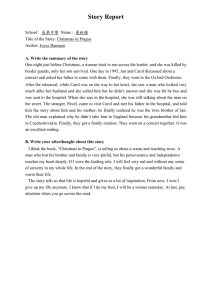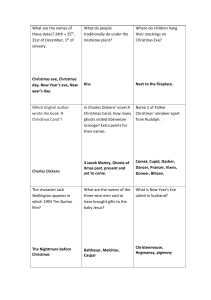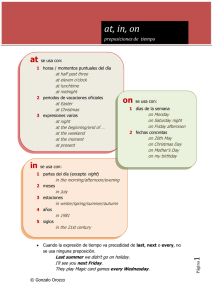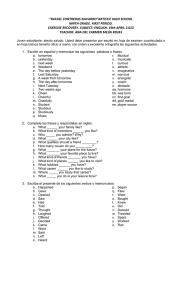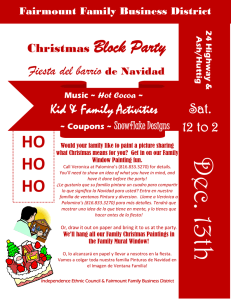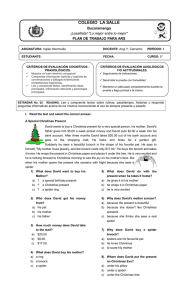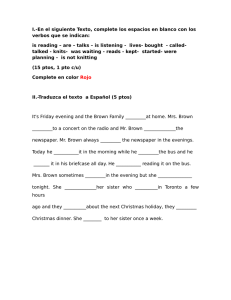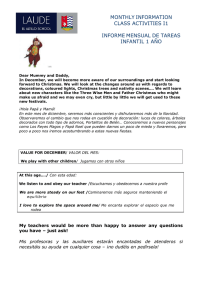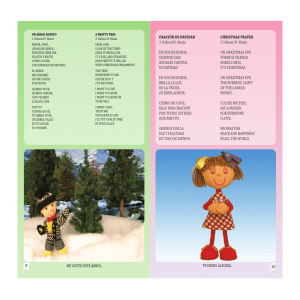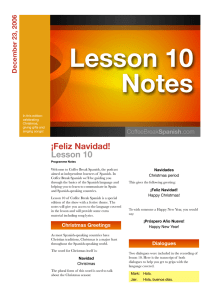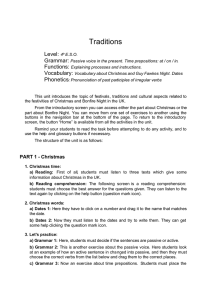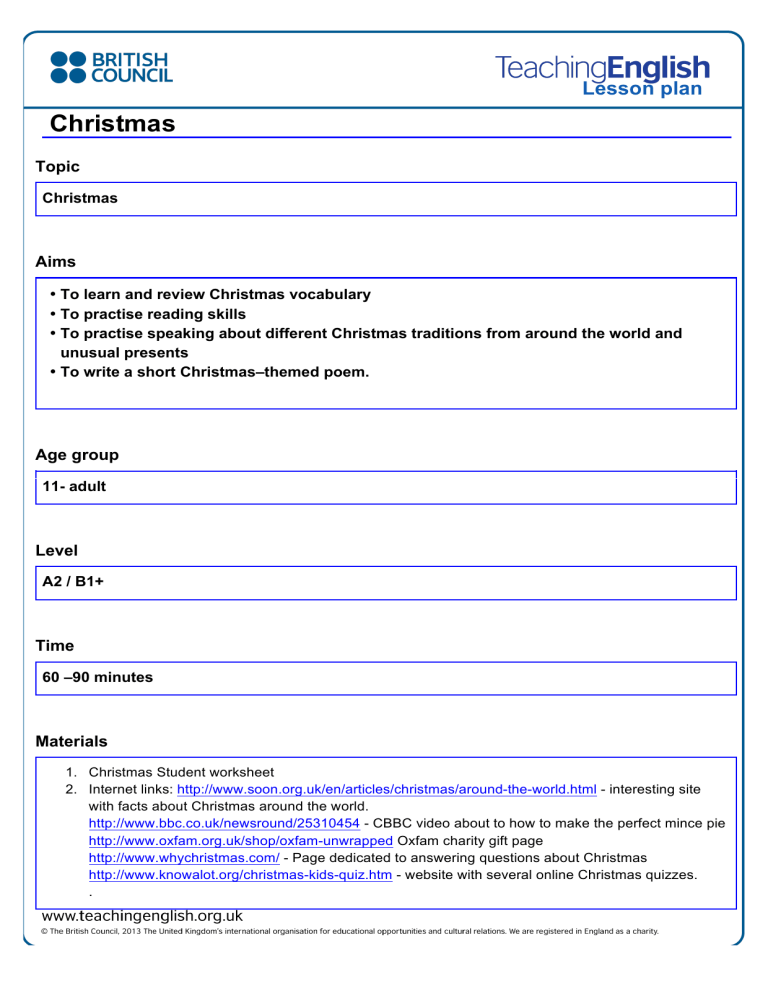
Lesson plan Christmas Topic Christmas Aims • To learn and review Christmas vocabulary • To practise reading skills • To practise speaking about different Christmas traditions from around the world and unusual presents • To write a short Christmas–themed poem. Age group 11- adult Level A2 / B1+ Time 60 –90 minutes Materials 1. Christmas Student worksheet 2. Internet links: http://www.soon.org.uk/en/articles/christmas/around-the-world.html - interesting site with facts about Christmas around the world. http://www.bbc.co.uk/newsround/25310454 - CBBC video about to how to make the perfect mince pie http://www.oxfam.org.uk/shop/oxfam-unwrapped Oxfam charity gift page http://www.whychristmas.com/ - Page dedicated to answering questions about Christmas http://www.knowalot.org/christmas-kids-quiz.htm - website with several online Christmas quizzes. . Lesson plan Introduction This lesson has some ideas for how to introduce the topic of Christmas. Your own experiences and thoughts about the festive season will enhance the lesson and you will be a great source of information for your students on this theme. The lesson begins with some simple warmer or filler tasks. Task 2 is a mini-quiz about Christmas around the world and could be a useful starting point to talk about Christmas traditions where you're teaching or about other winter festivals if you’re in a country that doesn’t celebrate Christmas. Task 3 is based on a reading text about Christmas in the UK. It is aimed at intermediate level students and above and could be used as a spring-board into a discussion about many aspects of the festive season. Task 4 gets students to think of three resolutions for the new year and this is followed by some more creative tasks aimed at younger learner. Task 7 is aimed at teenagers and looks at some unusual gift ideas for Christmas. Mix and match the activities as you feel suitable to your class and add your own ideas too to make a personalised Christmas class. If you need flashcards of Christmas items to teach vocabulary you’ll find a very nice set that you can download and print from the British Council’s LearnEnglish website. Here’s the link to the flashcards section: http://www.britishcouncil.org/kids-flashcards.htm You’ll also find lots of games and activities related to Christmas on this site too. The homepage is: http://www.britishcouncil.org/kids Procedure 1. Task 1 – Christmas puzzle If you have any visual aids such as Christmas cards or any Christmassy pictures you could use them first to get students thinking about the theme. Alternatively use the Christmas flashcards mentioned above and then ask students to see how many words they can remember from the flashcards you’ve presented. Making an acrostics puzzle like this is one way to brainstorm the new vocabulary. Words must be interlinked like crosswords are. Encourage students to think of anything at all they think of when they think about Christmas time. Start this activity together so the students get the idea, then let students continue in pairs or groups and see how many words they can link up. For example: P C H R I S T M A S E N S O E W N T S Lesson plan 2. Task 2 – Happy Christmas word hunt This is a simple ten minute warmer or an activity you could use if you have a few minutes to fill at the end of the lesson. Students work in pairs or groups and see how many words they can make from the letters in HAPPY CHRISTMAS. (For example; PARTY, MISTY, THIRST……) Points could be awarded for the longest word or the biggest quantity of words found. 3. Task 3 – Where in the world? This is a quiz for students to see how much they know about how Christmas is celebrated in other parts of the world. Start with the discussion questions then put students in teams or groups to do the quiz. Answers: 1 – e / 2 – c / 3 – h / 4 – b / 5 – f / 6 – d / 7 – a / 8 - g 4. Task 4 –What does Christmas mean to people in the UK? . You can use the as a starting point to talk about different aspects of the festive season. Put students into small groups and divide the paragraphs of the text between them. It may be better to cut up the text and give each student only their paragraph/s, otherwise it can be too tempting to go ahead and read the whole text. As a jigsaw reading they have to then tell the group about what they read. If you are in a country where Christmas is not celebrated you could use the text as a jigsaw reading and then encourage the students to ask you questions about how you celebrate Christmas. Students do the true or false exercise in pairs to check comprehension. 5. Task 5 – New Year’s resolutions You could introduce this by writing the new year on the board. Ask students what they would like to change in the next year. Give some examples of resolutions you have made in the past or ones you’d like to make this year and explain the tradition of making new year’s resolutions. 6. Task 6 – Christmas poems Give a simple example of an acrostic poem on the board. They don’t have to be masterpieces, just short phrases or images relating to Christmas. If you have time, students could then design simple Christmas cards and write their poems on the inside. 6. Task 7 – Unusual Christmas presents If you’ve ever received an unusual gift introduce this task by telling your students about it. Then put students into groups of five and ask them to read the different texts. Students then discuss the good points and bad points about each gift and order from the best to the worst. Use them as a discussion starter for talking about the giving and receiving of gifts. You could also use the Oxfam website to talk about giving charity gifts, which are also often unusual. See the link below to Oxfam Unwrapped. Contributed by Jo Budden

